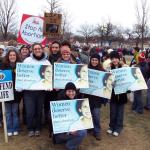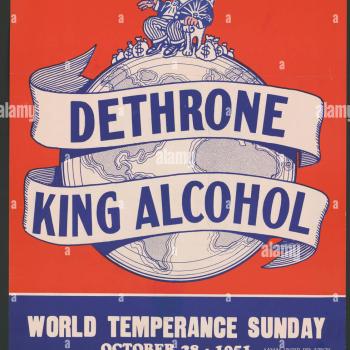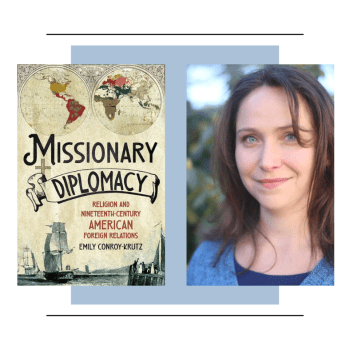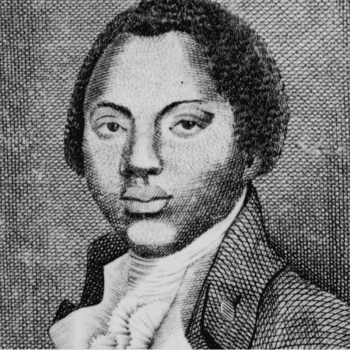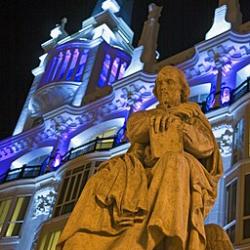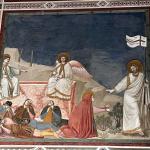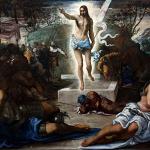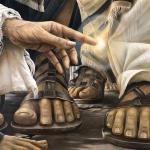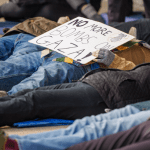Historians have long argued that American evangelicalism is a transatlantic religious movement. However, according to Helen Jin Kim, that’s only half the story. Kim, who is Assistant Professor of American Religious History at Emory University, explained that “it simply is not possible to understand evangelicalism without looking at transnational linkages and movement across the Pacific, especially when we move into the twentieth century.” In her view, scholars must “take seriously the importance of writing transpacific American religious history.”
This topic is the subject of Kim’s new book, Race for Revival: How Cold War South Korea Shaped the American Evangelical Empire, published by Oxford University Press this spring. In Race for Revival, Kim builds on some of the ideas she presented in her first book, Family Sacrifices: The Worldviews and Ethics of Chinese Americans, published by Oxford University Press in 2019. In that book, she and her coauthors Russell Jeung and Seanan Fong showed how contemporary Chinese Americans, despite being religious “nones,” nevertheless have rich spiritual lives.
Compared to Family Sacrifices, Race for Revival is a very different book, one that uses archival research to offer a historical account of a different religious community in a different time and place. Nevertheless, it advances one of the same core arguments that Kim made in her first book: that engaging in Asian and Asian American experiences changes how we understand American religious life.
I had the good fortune of discussing Race for Revival with Kim this month.
Tell us the story behind your book. How did you come to this topic?
There are multiple origin points for this book. First, as I describe in the Preface, I started asking questions about religion and inequality as a college student at Stanford. That led me to choose Comparative Studies in Race and Ethnicity (CSRE) as my major, and write a college thesis on the history of Japanese American liberation theologies, which political scientist Carolyn Wong supervised. Those early conversations with Carolyn, an activist in the Asian American social movement of the 1960s and 1970s, inspired me to ask hard questions about race and religion. She believed in my work, and Paul Chang who was a sociology PhD student at the time (interested in minjung theology, and who eventually served on my dissertation committee at Harvard) suggested that I present my college thesis at the Asian Pacific American Religion and Research Initiative (APARRI). I presented my research that summer at the APARRI conference hosted at the Graduate Theological Union, and I became completely enamored with the work of these scholars. I then worked with Brett Esaki, Russell Jeung, Jim Lee, Tat-siong Benny Liew, and Sharon Suh on a collaborative project on Asian American evangelicals and the Bible. I just kept going, asking questions that I then pursued at the Harvard Divinity School. That became further solidified when I met my dissertation advisor David Hempton, and the rest is history!
What is the main argument of your book?
Race for Revival is the first book to tell the history of modern American evangelicalism through a Pacific frame. I incorporate otherwise invisible Asian and Asian American figures into the narrative, and I highlight a geographic region that has not been foregrounded in the recent groundswell of interest in global histories of US evangelicalism. The book argues modern evangelical America remade itself, from the Korean War to the rise of Reagan, in part by crossing national borders across the Pacific for world evangelization. In so doing, Race for Revival reveals that Koreans were core to the making of modern evangelical America, which is an otherwise unknown story in the grand narrative of the making of the movement. Yet the transpacific dimensions of race and US empire building prevented Cold War South Koreans from taking full ownership over the very religious world they helped to build. Instead, they were incorporated them into the machinations of the US and South Korean Christian Right in the 1980s and 90s. I use English and Korean archival sources and oral histories as well as weave together unlikely literatures from US religious history, world Christianity, and race and religion.
How does this book change how we think about American evangelicalism?
Race for Revival suggests that we can rethink American evangelicalism—especially in the modern period—in several ways. First, the long evangelical movement, which has its roots in the eighteenth century, is primarily imagined as an Atlantic movement. That early origin story spills over into the way that modern evangelical America is also imagined. My book reframes the evangelical movement as a Pacific one, and suggests that it simply is not possible to understand evangelicalism without looking at transnational linkages and movement across the Pacific, especially when we move into the twentieth century.
Second, we, therefore, have to recover the story of the movement of goods, ideas, and people across the Pacific that shaped the modern evangelical world. That requires, in part, that we not only highlight the evangelical stories of white, Black and Latinx people in the Pacific world, but also make visible the otherwise invisible stories of people of Asian descent in the making of those histories.
Third, as a result, we can then see the creative contributions that people of Asian descent in the making of modern evangelical America, on both sides of the Pacific and that includes not only Asians in Asia but also Asian Americans. Thus, my book is a good building block for highlighting the role of Asian American evangelical actors in the making of modern evangelical America, which I am excited Jane Hong Lee’s forthcoming book with Oxford will address head on.
Fourth, when we highlight these stories, however, we also see the difficult underside of these histories, which includes themes such as race, empire and war, to name a few. When we reimagine modern evangelical America in Pacific context, we see how much of its growth into a racial empire depended on the invisible labor of people of Asian descent, the extent to which Asian people were exploited to build the movement, and the ways in which they also became entangled in the inner workings of the US evangelical empire, including its alliances with authoritarian regimes.
Fifth, we see how the Cold War in Asia shaped the binary theology of modern evangelical America, hardening its religious imagination of good versus evil, saved versus unsaved, which mapped onto a racial and political imagination that has contributed to the polarizations that we see in our world today, at the multiple intersections of the culture wars—including in debates over the family, gender and sexuality.
One thing that’s important about your book is that it is intentionally transpacific. How does the vantage point of the Pacific world change how we understand American Christianity?
I hope for the field of US religious history to take seriously the importance of writing transpacific American religious history. By the same token, I hope for transpacific and Asian American histories to take seriously the importance of writing religious history. This is essentially building upon an early insight from historian David Yoo in his edited volume New Spiritual Homes. Moreover, because this book crucially takes into consideration debates in world Christianity as well as religion and the Cold War, I hope for a more rigorous treatment of the Pacific world in shaping conversations in those fields with regard to indigenous agency and the making of race.
What’s up next for you? Any future projects you’re beginning now that this book is out?
I am currently working on two new book projects: one on the prosperity gospel in transpacific frame, and the other on a history of religion and the Asian American social movement.






